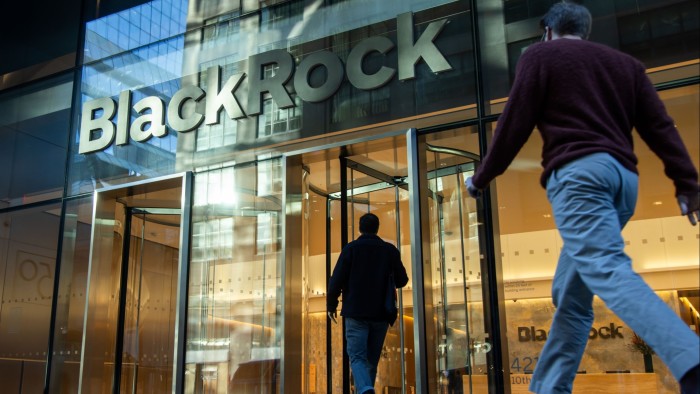Unlock the Editor’s Digest for free
Roula Khalaf, Editor of the FT, selects her favourite stories in this weekly newsletter.
From passive to highly aggressive. BlackRock has built a dominant platform in the basic, low-cost ETFs and index funds that track public debt and equity markets. That success has been enough to create a company with a $150bn equity value and apparently a substantial war chest.
BlackRock on Tuesday said it would acquire the private credit manager HPS for $12bn to be paid in shares. Earlier this year, it acquired Global Infrastructure Partners for almost $13bn, mostly in BlackRock equity as well. It also spent $3bn in cash to buy the private markets data provider Preqin.
All this adds up to a BlackRock with more than $400bn in alternative assets under management. That figure is still dwarfed by the group’s overall assets under management of $11tn. But the acquisition spree is enough to make it suddenly one of the most relevant private capital managers in the world, if at a sharp cost to its current shareholders.
In the past five years, BlackRock shares have slightly more than doubled. That is somewhat better than the S&P 500. Yet over the same timeframe, private capital groups Blackstone, KKR and Apollo are up between 250 per cent and 450 per cent. Blackstone, which manages $1tn, has a market cap of $230bn while KKR has essentially the same value as BlackRock.
Those valuations for private capital firms have forced huge buyout prices for HPS and GIP into the range of 30 to 35 times earnings from management fees (Preqin was acquired at a nosebleed 13 times revenue).
BlackRock is insisting there are significant synergies between its traditional business and the firms it has bought. Its existing insurance clients, for example, will now have access to the kinds of private credit products that are increasingly popular. More generally, the group’s retail, wealthy and institutional clients will have more to choose from at a one-stop shop.
While the maths might make sense on paper, there is the question how BlackRock’s culture will change with all these Masters of the Universe now circulating in the building. There is no other firm of this scale attempting to pull off this so-called barbell strategy of passive funds on one end and fancy, pricey alternative assets on the other. This execution risk is only heightened by how much it has cost to put it together.
Read the full article here

